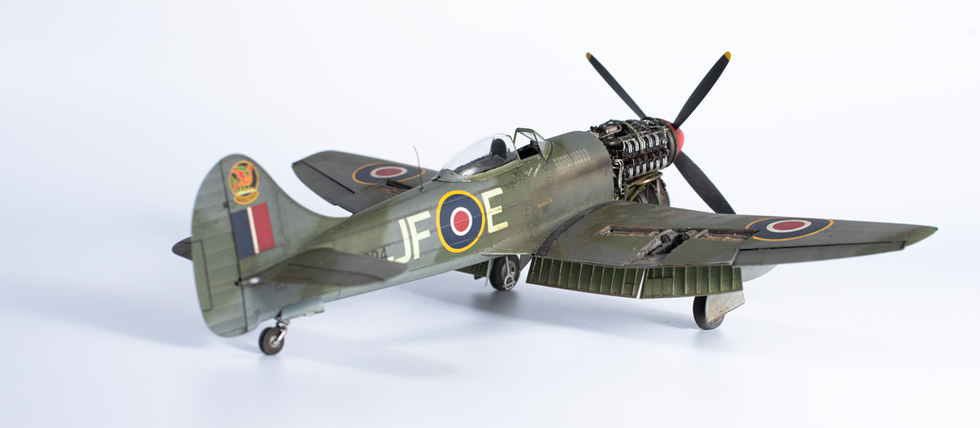
HAWKER
Tempest Mk. V Series 2




Marka:
Eduard
Skala:
1:48
Model:
Mk. V Series 2
Malowanie:
NV994, No. 3 Squadron, No. 122 Wing, B.152 Fassberg, Germany, June 1945
Czas budowy:
December 2021 : May 2022 (360h)
Model nr.
7
dodatki:
Eduard Tempest Mk V cockpit #648416
Eduard Tempest Mk V gun bays #648419
Eduard Tempest Mk V engine #648417
Eduard Tempest Mk V landing flaps #48977
Eduard Tempest Mk V wheels late #648421
Master Cannon Tipis & Pitot Tube #AM-48-134
Montex Maxi Mask #MM48495
Eduard Tempest Mk V undercarriage #648446
Eduard Tempest Mk V updrade set #48976
Yahu Tempest Mk V Instrument Panel #YMA4880
Informacje dodatkowe
Hawker Tempest is know for being RAF's last piston-engine pursuit aircraft, but that is not all. The Tempest was very effective in low-level interception role which resulted in many successes destroying V-1 flying bombs. Additionally due to its agility and speed he was a formidable opponent to newly developed jet-propelled aircrafts like the Messerschmitt Me 262.
Hawker Tempest was heavily modified version of Hawker Typhoon which from the very beginning suffered with bad performance due to its thick (NACA 22) wing section. New laminar flow design for the Tempest resulted in the wing that had more elliptical shape and was some 5 inches thinner at the root than the original. Due to the thinner wing there was not enough space for the fuel and additional tank had to be installed in the fuselage.
Of the five planned variants:
Tempest Mk I with Sabre IV engine
Tempest Mk II with Centaurus IV engine
Tempest Mk III with Griffon Mk IIB
Tempest Mk IV with Griffon 61
Tempest Mk V with Sabre II
only Mk V took part in WWII operations and was the main variant of the Tempest. Mk II entered service late and had no significant operational use during the war. Sabre IV was troubled by glitches and integration of the Griffon into Typhoon took much more time that it was anticipated which resulted in creation of only one prototype of Mk III and Mk IV was never built.
First prototype of Tempest Mk V with Sabre II engine flew for the first time on September 2nd, 1942. The first production aircraft made its maiden flight on June 21st, 1943 and achieved speed of 432 mph at 18,400 feet. Tempest became operational in April 1943 with 3rd and 56rh Squadrons.
Hawker Tempest Mk V series II which is the subject of this build had exactly same characteristics as series I, which were:
Napier Sabre IIA,B or C 24-cylinder 'H'-type engine
Four-blade Rotol or DH propeller
Bubble canopy
Production "Tempest-style" vertical fin and rudder
Enlarged (in comparison with Typhoon) horizontal tailplanes
Retractable tailwheel / doors
No reinforcing plates on rear fuselage
Engine cooler with carburetor air intake in chin cowling
The only difference from series I was by having the four Hispano V 20mm cannons buried entirely in the wings.
Galeria

























